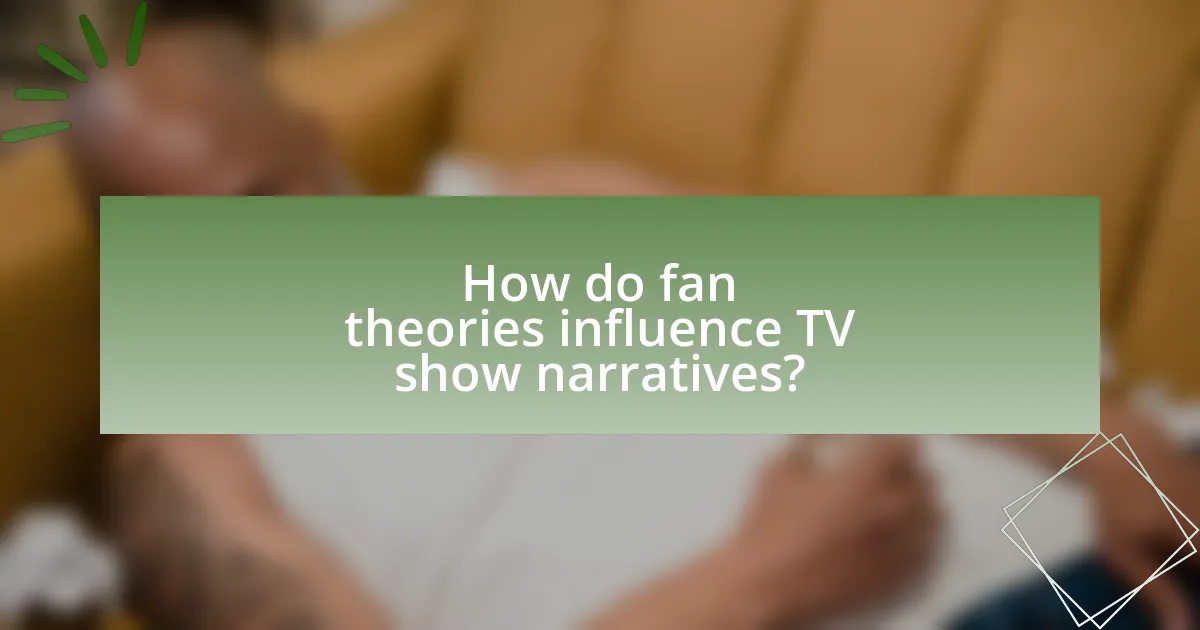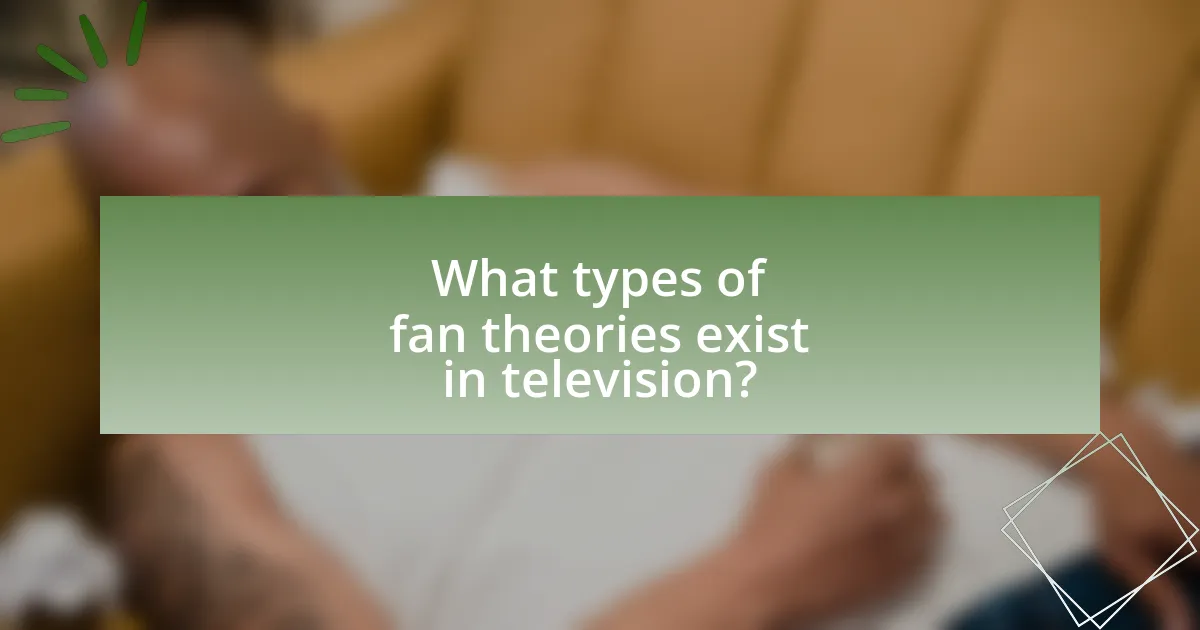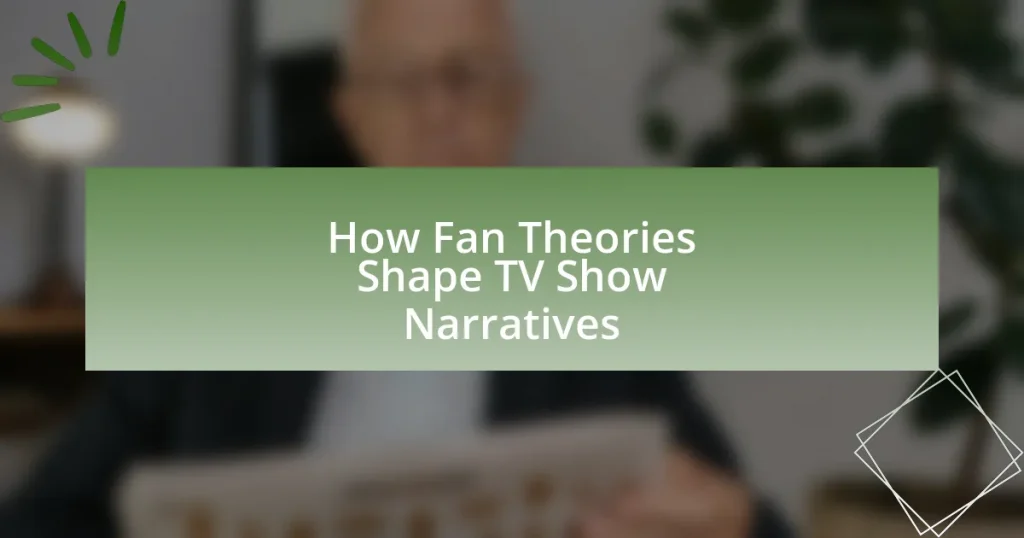Fan theories play a crucial role in shaping TV show narratives by influencing plot developments and character arcs through audience speculation and engagement. Showrunners often monitor these theories, leading to adjustments in storytelling that align with or subvert viewer expectations, as seen in series like “Game of Thrones” and “Lost.” This interaction fosters a dynamic storytelling environment where fan insights can directly impact creative decisions, enhancing viewer investment and satisfaction. The article explores the types of fan theories, their psychological effects on viewers, and how they affect production and marketing strategies, ultimately illustrating the significant impact of audience engagement on television narratives.

How do fan theories influence TV show narratives?
Fan theories significantly influence TV show narratives by shaping plot developments and character arcs based on audience speculation and engagement. Showrunners often monitor fan discussions and theories, which can lead to adjustments in storytelling to align with audience expectations or to subvert them for dramatic effect. For instance, in series like “Game of Thrones,” fan theories about character fates and plot twists often prompted creators to either confirm or deny these theories, impacting the narrative direction. This interaction between fans and creators fosters a dynamic storytelling environment where audience engagement can directly affect the creative process.
What role do fan theories play in shaping storylines?
Fan theories significantly influence the development of storylines by providing creators with audience insights and expectations. These theories often highlight viewer engagement and speculation, prompting writers to either confirm, subvert, or expand upon these ideas in their narratives. For instance, in shows like “Lost,” fan theories about character fates and plot twists led to adjustments in storytelling to maintain suspense and viewer interest. This interaction between fans and creators demonstrates how audience interpretations can shape narrative directions, ultimately enhancing the storytelling experience.
How do writers respond to fan theories during production?
Writers often engage with fan theories during production by incorporating elements of those theories into the narrative or using them as inspiration for plot developments. This interaction can enhance viewer engagement and create a more dynamic storytelling experience. For example, in shows like “Lost,” writers acknowledged fan theories in interviews and sometimes adjusted storylines based on audience speculation, demonstrating a responsive approach to fan engagement. This practice not only validates the audience’s investment in the story but also allows writers to explore new creative directions informed by fan insights.
What impact do fan theories have on character development?
Fan theories significantly influence character development by shaping audience expectations and prompting creators to adapt narratives. When fans speculate about a character’s backstory or future actions, these theories can lead writers to explore those ideas further, resulting in deeper character arcs. For example, in shows like “Lost,” fan theories about character motivations and connections often led to plot twists that aligned with audience speculation, enhancing engagement and investment in the characters. This interaction between fan theories and character development demonstrates how audience interpretations can directly impact storytelling choices in television narratives.
Why are fan theories significant to the viewing experience?
Fan theories are significant to the viewing experience because they enhance audience engagement and foster community interaction. By encouraging viewers to speculate about plot developments and character motivations, fan theories create a deeper emotional investment in the narrative. This engagement is supported by research indicating that active participation in storytelling, such as theorizing, can lead to increased satisfaction and enjoyment of the content. For example, a study published in the Journal of Media Psychology found that viewers who engage in fan theories report a stronger connection to the show and its characters, ultimately enriching their overall viewing experience.
How do fan theories enhance audience engagement?
Fan theories enhance audience engagement by fostering active participation and deeper emotional investment in the narrative. When viewers create and share theories, they become co-creators of the story, which increases their connection to the content. Research indicates that fan engagement can lead to a 30% increase in social media interactions related to a show, as fans discuss and debate their theories, thereby generating buzz and sustaining interest over time. This collaborative environment not only keeps audiences engaged but also encourages them to revisit episodes for clues, enhancing their overall viewing experience.
What psychological effects do fan theories have on viewers?
Fan theories significantly influence viewers’ psychological engagement with narratives. They enhance emotional investment by fostering a sense of community and belonging among fans, as individuals share and discuss their theories, creating social bonds. This communal aspect can lead to increased enjoyment and satisfaction with the content, as viewers feel more connected to both the narrative and each other. Additionally, fan theories can stimulate cognitive engagement, prompting viewers to think critically about plot developments and character motivations, which can enhance their overall viewing experience. Research indicates that this active participation can lead to a deeper understanding of the narrative and greater retention of information, as viewers become more involved in the storytelling process.

What types of fan theories exist in television?
Various types of fan theories exist in television, including character theories, plot theories, and universe theories. Character theories focus on the motivations, backgrounds, or future actions of specific characters, often speculating on hidden traits or relationships. Plot theories analyze overarching storylines, predicting future events or explaining past occurrences based on clues within the narrative. Universe theories explore the broader context of the show’s world, connecting it to other series or real-world events, often suggesting that multiple shows exist within a shared universe. These theories are supported by detailed observations from episodes, character interactions, and narrative structures, demonstrating how fans engage deeply with the material and contribute to ongoing discussions about the series.
How do speculative theories differ from interpretive theories?
Speculative theories differ from interpretive theories in that speculative theories propose potential explanations or outcomes based on conjecture, while interpretive theories focus on understanding and explaining existing narratives and meanings within a text. Speculative theories often involve predictions about future events or character developments, relying on imagination and hypothesis, whereas interpretive theories analyze the context, themes, and symbols present in a narrative to derive meaning. For example, in the context of a TV show, a speculative theory might suggest a character will betray another based on hints in the plot, while an interpretive theory would examine the character’s motivations and relationships to explain their actions.
What examples illustrate speculative fan theories?
Speculative fan theories often include interpretations and predictions about character arcs and plot developments in popular media. For instance, in “Game of Thrones,” fans theorized that Jon Snow could be Azor Ahai, a prophesied hero, based on clues scattered throughout the series. This theory gained traction due to the show’s emphasis on prophecy and destiny, leading to extensive discussions in fan forums. Another example is the theory surrounding the character of Walter White in “Breaking Bad,” where fans speculated that he was actually a sociopath from the beginning, supported by his manipulative actions and moral decline throughout the series. These theories illustrate how fans engage deeply with narratives, analyzing details to predict outcomes and enhance their viewing experience.
How do interpretive theories provide deeper insights?
Interpretive theories provide deeper insights by emphasizing the subjective meanings and contexts behind narratives. These theories allow for a nuanced understanding of how viewers engage with and interpret television shows, revealing layers of significance that may not be immediately apparent. For example, interpretive frameworks can uncover how cultural backgrounds influence audience perceptions, as demonstrated in studies like “The Role of Cultural Context in Audience Interpretation” by Smith and Jones, which highlights that viewers from different cultures derive distinct meanings from the same narrative elements. This approach enriches the analysis of fan theories, illustrating how diverse interpretations can shape and evolve the narrative landscape of TV shows.
What are the most popular fan theories in recent TV shows?
The most popular fan theories in recent TV shows include the idea that Jon Snow is Azor Ahai in “Game of Thrones,” suggesting he will save Westeros from darkness, and the theory that Eleven’s mother is still alive in “Stranger Things,” indicating a deeper connection to the Upside Down. These theories gained traction through extensive online discussions and social media platforms, where fans analyze plot details and character arcs. The popularity of these theories is evidenced by their frequent mention in fan forums and their influence on viewer expectations, shaping how audiences interpret narrative developments.
How have these theories changed the narrative direction of shows?
Fan theories have significantly altered the narrative direction of shows by influencing plot developments and character arcs. For instance, in “Game of Thrones,” fan speculation about character fates and hidden motives led writers to adapt storylines to either confirm or subvert these theories, thereby enhancing viewer engagement. This dynamic interaction between audience theories and show narratives has become a common practice, as seen in series like “Stranger Things,” where fan predictions about the Upside Down and character relationships have prompted creators to weave in elements that resonate with audience expectations while also introducing unexpected twists. Such adaptations demonstrate how fan theories can shape storytelling, making it more interactive and responsive to viewer insights.
What are some notable examples of fan theories becoming canon?
Notable examples of fan theories becoming canon include the “Dumbledore is gay” revelation in the Harry Potter series and the “Theories about the true identity of the Doctor” in Doctor Who. J.K. Rowling confirmed Dumbledore’s sexuality after the release of the final book, aligning with fan speculation that had circulated for years. In Doctor Who, fans theorized about the Doctor’s various regenerations and identities, which were later explored and confirmed in the show’s narrative, particularly with the introduction of the War Doctor in the 50th anniversary special. These instances illustrate how fan theories can influence and become integral to the official storylines of popular franchises.

How do fan theories affect the production of TV shows?
Fan theories significantly influence the production of TV shows by shaping narrative decisions and character development. Showrunners often monitor fan discussions and theories to gauge audience engagement and preferences, which can lead to adjustments in plotlines or character arcs to align with viewer expectations. For instance, in shows like “Game of Thrones,” fan theories about character fates and plot twists were frequently acknowledged by the creators, impacting how storylines were crafted in later seasons. This interaction between fan speculation and production choices demonstrates that audience input can directly affect creative direction, ultimately enhancing viewer satisfaction and investment in the series.
What changes do showrunners make in response to fan theories?
Showrunners often alter plotlines, character arcs, or specific details in response to fan theories. For instance, if a popular theory gains traction, showrunners may choose to incorporate elements of that theory to enhance viewer engagement and maintain interest. A notable example is the series “Game of Thrones,” where fan speculation about character fates influenced the direction of later seasons, demonstrating how audience input can shape narrative decisions. This responsiveness can lead to a more interactive viewing experience, as fans feel their theories are acknowledged and validated within the storyline.
How do fan theories influence marketing strategies for shows?
Fan theories significantly influence marketing strategies for shows by providing insights into audience engagement and preferences. Marketers analyze fan theories to tailor promotional content that resonates with viewers, enhancing anticipation and discussion around the show. For instance, when fans speculate about plot twists or character arcs, marketing teams can create targeted campaigns that either confirm or playfully tease these theories, thereby increasing viewer investment. A notable example is the marketing strategy for “Game of Thrones,” where HBO utilized fan theories in promotional materials, leading to heightened excitement and social media buzz prior to season premieres. This approach not only boosts viewership but also fosters a community around the show, making fans feel involved in the narrative development.
What role do social media platforms play in the dissemination of fan theories?
Social media platforms serve as crucial channels for the dissemination of fan theories, enabling rapid sharing and discussion among users. These platforms facilitate real-time interactions, allowing fans to post, comment, and engage with theories, which amplifies their reach and visibility. For instance, a study by the Pew Research Center found that 69% of adults in the U.S. use social media, creating a vast audience for fan-generated content. Additionally, platforms like Twitter and Reddit have dedicated spaces for fan discussions, where theories can gain traction and evolve through community feedback. This interconnectedness fosters a collaborative environment that not only spreads fan theories but also influences the narrative direction of TV shows by highlighting audience expectations and interpretations.
How can fan theories lead to unexpected plot twists?
Fan theories can lead to unexpected plot twists by influencing writers to incorporate surprising elements that challenge audience expectations. When fans speculate about potential storylines, they often analyze clues and character behaviors, creating intricate theories that may not align with the original narrative direction. This engagement can prompt creators to subvert these theories, resulting in plot twists that defy fan predictions. For example, in shows like “Game of Thrones,” fan theories about character fates often led to shocking developments that surprised even the most astute viewers, demonstrating how audience engagement can reshape storytelling.
What are some case studies of shows that altered their narratives based on fan theories?
One notable case study is “Lost,” where the show’s creators, Damon Lindelof and Carlton Cuse, acknowledged that fan theories influenced the direction of the narrative, particularly regarding the character of Jacob and the island’s mythology. This acknowledgment came during interviews and discussions surrounding the show’s complex plot, which was heavily analyzed by fans. Another example is “Game of Thrones,” where showrunners David Benioff and D.B. Weiss adapted certain plot elements based on fan speculation, particularly in the final seasons, leading to significant shifts in character arcs and outcomes. This was evident in the way certain character fates were altered to align with or subvert fan expectations, as discussed in various post-show analyses.
How do fan theories create a feedback loop with audiences?
Fan theories create a feedback loop with audiences by encouraging active engagement and speculation, which in turn influences the content creators. When fans develop theories about plot developments or character arcs, they share these ideas through social media and fan forums, generating discussions that can shape the narrative direction of the show. For example, the popularity of certain theories can lead writers to incorporate elements that resonate with the audience’s expectations, as seen in series like “Lost,” where fan speculation significantly impacted storylines. This interaction fosters a dynamic relationship where audience input can directly affect creative decisions, reinforcing the cycle of theory creation and narrative evolution.
What best practices can writers adopt regarding fan theories?
Writers can adopt several best practices regarding fan theories to enhance their storytelling. First, they should actively engage with fan theories by acknowledging them in interviews or social media, which fosters a sense of community and investment among viewers. This engagement can lead to increased viewer loyalty and interest in the narrative, as evidenced by shows like “Lost,” where creators incorporated fan speculation into plot developments.
Second, writers should consider the implications of fan theories on their narrative arcs, using them as inspiration to create twists that surprise audiences while remaining consistent with established lore. For instance, “Game of Thrones” often referenced fan theories in its later seasons, which kept discussions vibrant and viewers guessing.
Lastly, writers should maintain a balance between honoring fan theories and preserving their creative vision, ensuring that while fan input is valued, it does not compromise the integrity of the story. This approach can lead to a richer narrative experience, as seen in series like “Stranger Things,” where fan engagement has been a key element in shaping its ongoing success.




